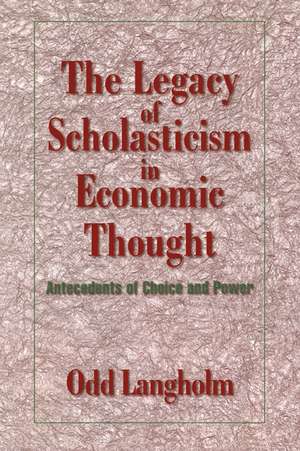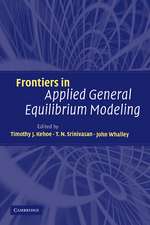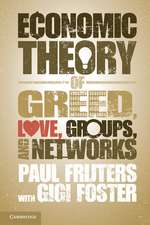The Legacy of Scholasticism in Economic Thought: Antecedents of Choice and Power: Historical Perspectives on Modern Economics
Autor Odd Langholmen Limba Engleză Paperback – noi 2006
| Toate formatele și edițiile | Preț | Express |
|---|---|---|
| Paperback (1) | 414.74 lei 43-57 zile | |
| Cambridge University Press – noi 2006 | 414.74 lei 43-57 zile | |
| Hardback (1) | 864.33 lei 43-57 zile | |
| Cambridge University Press – 12 feb 1998 | 864.33 lei 43-57 zile |
Din seria Historical Perspectives on Modern Economics
-
 Preț: 200.08 lei
Preț: 200.08 lei -
 Preț: 277.57 lei
Preț: 277.57 lei -
 Preț: 307.58 lei
Preț: 307.58 lei - 11%
 Preț: 536.98 lei
Preț: 536.98 lei -
 Preț: 288.62 lei
Preț: 288.62 lei -
 Preț: 277.65 lei
Preț: 277.65 lei -
 Preț: 350.91 lei
Preț: 350.91 lei -
 Preț: 430.14 lei
Preț: 430.14 lei -
 Preț: 289.19 lei
Preț: 289.19 lei -
 Preț: 321.90 lei
Preț: 321.90 lei -
 Preț: 441.58 lei
Preț: 441.58 lei -
 Preț: 400.76 lei
Preț: 400.76 lei -
 Preț: 323.27 lei
Preț: 323.27 lei - 11%
 Preț: 577.27 lei
Preț: 577.27 lei -
 Preț: 331.09 lei
Preț: 331.09 lei -
 Preț: 357.37 lei
Preț: 357.37 lei -
 Preț: 395.17 lei
Preț: 395.17 lei -
 Preț: 286.69 lei
Preț: 286.69 lei - 14%
 Preț: 787.78 lei
Preț: 787.78 lei -
 Preț: 364.08 lei
Preț: 364.08 lei -
 Preț: 355.54 lei
Preț: 355.54 lei -
 Preț: 357.91 lei
Preț: 357.91 lei -
 Preț: 259.95 lei
Preț: 259.95 lei -
 Preț: 272.75 lei
Preț: 272.75 lei -
 Preț: 442.22 lei
Preț: 442.22 lei - 14%
 Preț: 728.05 lei
Preț: 728.05 lei -
 Preț: 266.98 lei
Preț: 266.98 lei -
 Preț: 392.82 lei
Preț: 392.82 lei -
 Preț: 309.49 lei
Preț: 309.49 lei -
 Preț: 349.38 lei
Preț: 349.38 lei
Preț: 414.74 lei
Nou
Puncte Express: 622
Preț estimativ în valută:
79.36€ • 83.08$ • 65.67£
79.36€ • 83.08$ • 65.67£
Carte tipărită la comandă
Livrare economică 07-21 aprilie
Preluare comenzi: 021 569.72.76
Specificații
ISBN-13: 9780521032124
ISBN-10: 0521032121
Pagini: 228
Dimensiuni: 151 x 228 x 13 mm
Greutate: 0.34 kg
Ediția:Revised.
Editura: Cambridge University Press
Colecția Cambridge University Press
Seria Historical Perspectives on Modern Economics
Locul publicării:New York, United States
ISBN-10: 0521032121
Pagini: 228
Dimensiuni: 151 x 228 x 13 mm
Greutate: 0.34 kg
Ediția:Revised.
Editura: Cambridge University Press
Colecția Cambridge University Press
Seria Historical Perspectives on Modern Economics
Locul publicării:New York, United States
Cuprins
Preface; Introduction; Part I. Compulsion and the Will: Three Ancient Traditions: 1.The Aristotelian tradition; 2. The Roman law tradition; 3. The Augustinian tradition; Part II. Need as Compulsion: The Scholastic Paradigm: 4. Loans and usury; 5. Price and market manipulation; 6. Need and the will in buying and selling; 7. Labor and wages; Part III. Rejection and Revival in Postscholastic Thought: 8. Hobbes: the antithesis; 9. The economics of natural law; 10. The neoclassical system and its critics; Bibliography; Index.
Recenzii
"Langholm has shown that the original Scholastic analysis of the market process drew on Aristotelian and Roman law concepts of volition and free choice as the basis for justice in exchange. Realistic appraisals of need and institutions resulted i practical policies that qualified these premises, paralleling modern institutionalism. This provocative study implicitly demands further investigation of the ideological milieu that produced a naturalistic economics based on the specious Benthamite assumption of ubiquitous rationality." S. todd Lowry, Washington and Lee University
"Odd Langholm's The Legacy of Scholasticism in Economic Thought is an extraordinary achievement. langholm has written an immensely insightful and richly textured history of the development of teh idea of economic compulsion." Isis
"...Langholm has done more than any scholar to uncover the widely scattered sources of Scholastic economic thought, to reimagine the shape and logic of a tradition that lasted more than four centuries, and to bring the subject to a wide audience. It presents a wealth of textual evidence culled from an impressive array of sources,,,this work is directed at least as much to modern historians and economists as it is to medievalists...the intent, informational content, and overal conception of the book are praiseworthy...It may indeed work for the audience who, educated primarily in modern economic theory, will be introduced to another, clearly quite sophisticated, set of assumptions about the ethical dimensions of exchange. There is much in this book that will enlighten and impress them." Speculum: Journal of Medieval Studies
"Odd Langholm's The Legacy of Scholasticism in Economic Thought is an extraordinary achievement. langholm has written an immensely insightful and richly textured history of the development of teh idea of economic compulsion." Isis
"...Langholm has done more than any scholar to uncover the widely scattered sources of Scholastic economic thought, to reimagine the shape and logic of a tradition that lasted more than four centuries, and to bring the subject to a wide audience. It presents a wealth of textual evidence culled from an impressive array of sources,,,this work is directed at least as much to modern historians and economists as it is to medievalists...the intent, informational content, and overal conception of the book are praiseworthy...It may indeed work for the audience who, educated primarily in modern economic theory, will be introduced to another, clearly quite sophisticated, set of assumptions about the ethical dimensions of exchange. There is much in this book that will enlighten and impress them." Speculum: Journal of Medieval Studies
Descriere
This book studies the development of ideas on freedom, coercion and power in the history of economic thought.














